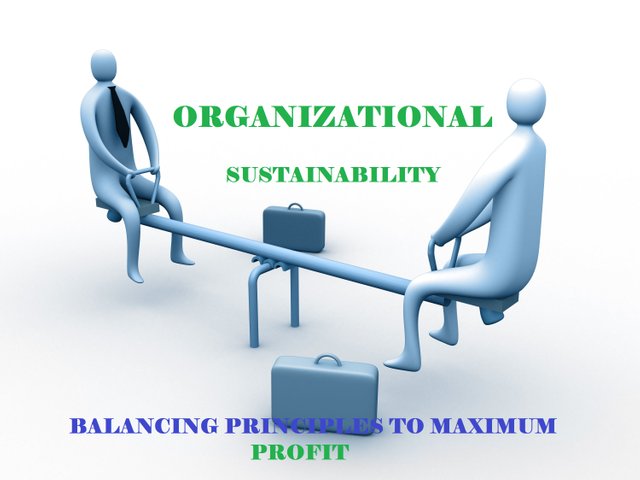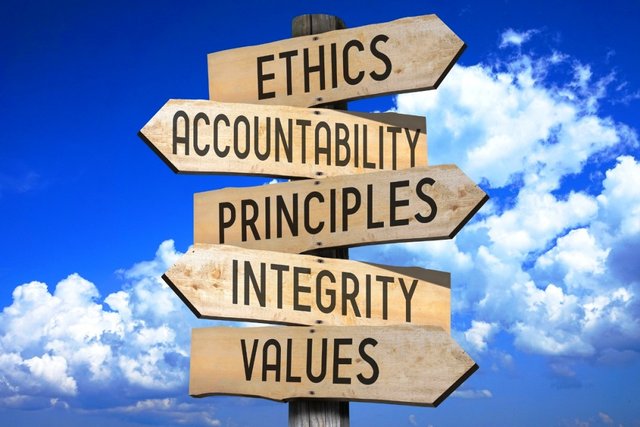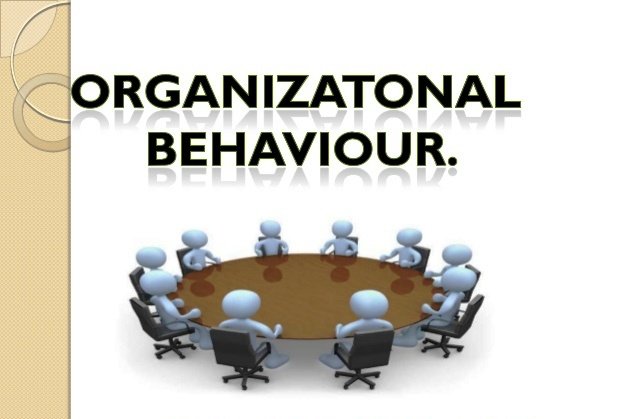INTRODUCTION

There is one thing to establish an organization and another to sustain it existence. Over the years, in a world were different organizations thrived for dominance, competition increases and there is therefore a great need to have a concrete strategy in sustaining organizations. This includes the ethical measures that are taken to make such organizations goals are achieved in the present without compromising the future of such organizations. These measures range from social, environmental conditions and human resources management. What are the dos and don’ts to have a friendly environment and better human work force output? Organizational sustainability means configuring civilization and human activity in an organization so that society, its members and its economies are able to meet their needs and express their greatest potential in the present, while preserving biodiversity and natural ecosystems, planning and acting for the ability to maintain these ideals for future generations.
Organization sustainability involves creating a conducive condition for materials, machines, workers and the general environment without compromising the effect that can be caused when any of these sectors are mismanage or handled. The level in which organization sustainability is taken determines it productivity. Organization Sustainability creates a form of reputation to organization. A company that has waded through all form of economical, social and environmental setbacks is likely to have a good organizational reputation and hence it will be well patronized. Human resource management also adds it own quarter to the general organizational sustainability as staffs of such organizations will likely perform in their optimum to see the zenith of the organization.
WHY SHOULD AN ORGANIZATION CONSIDERED IT FUTURE?
Businesses are established to make profit for a long period of time. Every organization wants to make more profit as each day comes whether it takes to be unethical. Organization sustainability guarantees if an organization will improve in it profit making. What many management of different organization failed to understand is that they cannot take so much from a system without giving some of it back.

source
One of the important factors that has been ignored by organizations is it environment wellbeing. Taking a case study of Nigeria, especially the Niger Delta region, there has been upheaval of communities seeking to be recognized and developed due to the wealth it consistently generates to the general country especially the oil sector. These communities cried of oil spillage and negligence by the oil companies who mine the wealth of this region without considering the effect it caused to it citizens’ health and the general environmental hazards. Most of these organizations undermined these complaints even when these conditions are obvious. This has led to oil pipelines being vandalized, oil companies’ facilities being destroyed by the indigenes who thought their wealth is being stolen and not much is being done for them. Despite these companies have made a lot of trillions of dollars, it is no doubt they would have made more if these conditions were thoroughly considered and catered for.
This has been the situation of things as companies thought the general ethics of business sometimes conflicts business ethics. Therefore, what is an ideal business ethic? In this review, I will talk on business ethics, general ethics how being ethical can affects either positively or negative to organization sustainability.
WHAT IS BUSINESS ETHICS AND GENERAL ETHICS
In simple words, Business ethics is simply the set of principles of right and wrong behavior or activities guiding the business or an organization to achieve the sole aim of establishing such business (to make profit). Therefore, compromising these set of principles for a different purpose would be detrimental.

source
On the contrary, general ethics can be said to be the natural principles that guides a society or a group of people. Believes and demands can also be considered as their ethical measures.
Now for a company to exceed greatly in an environment, the company has to balance these set of principles that will also see to it aim of establishment and keep it in good conditions for all times.
This summary works focuses on the relationship between ethics and organizational sustainability.
ETHICAL PRACTICES AND ORGANIZATIONAL SUSTAINABILITY
Theoretically, the Shareholder theory or the classical view of an organization demands that an organization is established for the aim of making profit for its shareholders whether it is against the morals or norms of a society or not. The aim is just to make profits and any of such ethics that would jeopardized this aim is not justified or accepted unless it will at the end maximized profits to the shareholders. In other words this view can be unethical to the environment or people if their principles or morals are or will not yield any profit to the shareholders of such organizations.
On the other hand, Ethics is the concept of morals; the principle and the ability to chose between right or wrong, good or bad, acceptable or unacceptable (Desjardins, 2009). source. On the perspective of an organization, ethic could mean the principle or morals taken just to satisfy the aim of establishing the organization. According to Velasquez (2009) “it is a specialized study of moral right and wrong; whereas Garrett (2012) defined it as “the relationship of business goals and techniques to specific human ends.” It studies the impacts of acts on the good of the individual, the firm, the business community, and society as a whole.
CONFLICT OF INTEREST (ETHICAL PRACTICES)
It is a very difficult task to see a business organization that it ethics are satisfactory or agreeable to everyone whether human workers and non workers or the environment the business is situated. Just as people have different perspective of viewing things so also ethical measures differs.

source
However, business ethics seeks only to maximize profit but it environment seeks to also benefit from this profit made and that would be justice.
HOW THEN CAN AN ORGANIZATION TACKLE THIS?
An ideal ethical business practice can simply be said to be the daily principles that an organization adhere to in managing it affairs with it resources (human resources, machine, and raw materials, socially etcetera) and environment as a whole. When an organization tends to act selfishly, it results to jeopardizing the existence of such organization. Ethical practices includes the Integrity of parties involved, justice and fairness of parties involved and true accountability that guarantees trust between parties (Dimension of ethical practices).
THE CONCEPT OF ORGANIZATIONAL SUSTAINABILITY
Just as I have always said, organizational sustainability is the act of having an assurance of the existence of a busy for a long time. Organizational sustainability has to do with the survival of organization over the time. Organizational sustainability is defined differently by different authors depending on their perspective of the subject. It is defined either ecological concern or as social responsibility of an organization. It is therefore can be summarized to be the integration of social, environmental, and economic concerns into an organization’s culture, decision-making, strategy, and operations; balancing both ends to have a win-win situations.
In measuring the organizational sustainability, the following factors are considered:
- Financial Sustainability of an Organization: This involves the monetary strength or financial resources of an organization. Without financial strength an organization will likely go into bankrupt and therefore fold up in operation. An organization should there find a means of internal revenue to generate funds for it activities ranging from salaries, maintenance fees of equipments, community development levies and maintenance etcetera.
- Strategic sustainability: Organization has to seek for ways to integrate their own principles to the environment principles in order to have a sustainable organization. As people are different, so also their principles differ.
- Lastly, Project/program management are also another sector in which sustainability is need. There must be effect principles guiding the completion of projects and programs in the organization. In this way, good reputation can be developed.